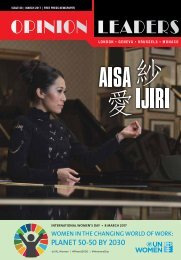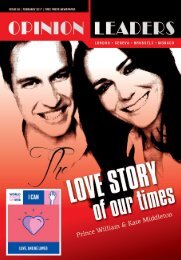OPINION LEADERS ISSUE 10
Summer Issue 10 of the Opinion Leaders Newspaper
Summer Issue 10 of the Opinion Leaders Newspaper
You also want an ePaper? Increase the reach of your titles
YUMPU automatically turns print PDFs into web optimized ePapers that Google loves.
LAYLA<br />
RAMEZAN<br />
“I am at my most honest and true self when at the piano”<br />
Layla Ramezan has always sought to create a<br />
connection between her Persian origins and<br />
the contemporary music which she encounters<br />
daily. As pianist and president of the Geneva<br />
based Matka Contemporary Ensemble, she<br />
has instigated several intercultural exchange<br />
projects with Iran and collaborated with<br />
composers such as Tristan Murail, Michael<br />
Jarrell, Luis Naón, Nicolas Bolens and<br />
William Blank. Her musical education began<br />
in Tehran with Mostafa-Kamal Pourtorab. After<br />
moving to Paris in 2000, she attended the<br />
École Normale de Musique de Paris “Alfred<br />
Cortot,” followed by Lausanne’s Haute École<br />
de Musique, obtaining two Master’s degrees<br />
in performance and accompaniment. She is<br />
sponsored by Albert Roussel Fondation in<br />
Paris and Engelberts Fondation in Lausanne.<br />
She is the founder and artistic director of the<br />
“Barbad Piano Prize” competition in Shiraz for<br />
the young pianists. Layla Ramezan tours and<br />
performs in Europe, USA, Canada and Iran and<br />
appears as soloist with the Tehran Symphony<br />
Orchestra and the Tehran Orchestra for New<br />
Music. Her performances had been<br />
broadcasted by Radio France, RTV Swiss<br />
,NPO Netherlands and CBC Radio Canada. Her<br />
primary recording project is <strong>10</strong>0 Years of Iranian<br />
Piano Music(Label Paraty Production (Harmonia<br />
Mundi)), which will span four volumes, the first<br />
of which was released in January 2017 and<br />
it exposes the 50's and beyond Iranian piano<br />
music.<br />
Q: Layla please tell me, when and<br />
mainly what was the crucial motive<br />
that opened you door to the wonderful<br />
world of music?<br />
A: The first time that I heard the piano,<br />
I fell in love with the sound of the instrument.<br />
I insisted immediately to my<br />
parents that they buy one. Eventually,<br />
they gave in and I started to take piano<br />
lessons when I was seven years old.<br />
Q: How do you combine your Persian<br />
roots with classical music and<br />
your apparent contemporary influence?<br />
A: For me, Persian traditional music<br />
and European Classical music are two<br />
very different worlds of music. The one<br />
type seeks freedom through structure<br />
and written notation, and the other rejects<br />
these notions with the hope that<br />
something new is created from this. My<br />
interpretation is a collision of these two<br />
worlds. I am always trying to express<br />
and inspire myself with one world or<br />
the other, with a focus that strays away<br />
from stereotypes. For example, all of<br />
the Traditional and Folk Persian music<br />
of my childhood in Iran, has given me<br />
a particular sensitivity to rhythm in<br />
Western Music.<br />
Q: What describes best your musical<br />
character? Are you the same<br />
person in everyday life with Layla<br />
whilst performing?<br />
A: I always try to be very honest in my<br />
interpretation and faithful to the score<br />
which I am interpreting. I can say that<br />
I am at my most honest and true self<br />
when at the piano.<br />
Q: You have been many times performing<br />
on the occasion of Iranian<br />
events. Are there state representatives<br />
in arts and especially in<br />
music?<br />
A: In recent years I have had performances<br />
in Iran in various different<br />
cities. Some of these performances<br />
were organized and supported by the<br />
“Iran Music Association” (anjoman e<br />
moosighiy e Iran), which is one of the<br />
musical state representatives. Sometimes<br />
these concerts are supported by<br />
private foundations such as “Sharhr e<br />
Aftab” in Shiraz. However, in general<br />
when you perform in Iran as an artist<br />
you need permission from the government.<br />
Q: Would you like to name people<br />
that have influenced you until<br />
today, but also people that our<br />
readers should be aware of their<br />
names and their contribution to<br />
music?<br />
A: I would like to mention my husband,<br />
Blaise Ubaldini, renowned French<br />
composer and clarinetist, whose way<br />
of seeing music is always a source of<br />
strong inspiration both in my life and<br />
my projects. My first professor, Mustafa-<br />
Kamal Pourtorab, had a very important<br />
role in the development of my artistic<br />
personality and Svetlana Navassardyan,<br />
the great Armenian pianist, who<br />
taught me during my years in Paris.<br />
Among the great composers across<br />
all centuries, I would like to mention<br />
and quote Mozart, as he said, “By the<br />
power of music, we will walk cheerfully<br />
through the dark night of death”. Also,<br />
the great musical personalities such as<br />
Pierre Boulez, Daniel Barenboim and<br />
Giorgy Sokolov, without forgetting the<br />
great proponents of Iranian music such<br />
as the composer Fozié Majd and the<br />
researcher Mohammad-Reza Darvishi.<br />
Mr. Darvishi travelled across Iran<br />
over a period of thirty years in search<br />
of the roots of Iranian regional music,<br />
creating his prize awarded book named<br />
“the Encyclopedia of the Musical<br />
Instruments of Iran.”<br />
Q: What is your involvement with<br />
young artists, how do you promote<br />
music to the young generations?<br />
You have been part of groups like<br />
the “Triofan3mg” that one could<br />
say that radicalize<br />
in the promotion<br />
and performance of classical instruments.<br />
A: I love to teach the piano and to give<br />
the benefit of my musical experience<br />
and knowledge to my young students.<br />
I always try to pass on, the love of the<br />
very pure music of my childhood combined<br />
with the knowledge I gained studying<br />
in Europe. I am also the Artistic<br />
Director, and one of the founders, of the<br />
« Barbad Piano Prize » in Iran-Shiraz.<br />
My goal is to increase the motivation<br />
there to create a healthy competitive<br />
environment for youth. In addition to<br />
this I would like to create an opportunity<br />
for Iranian pianists to study in world<br />
class international music institutions<br />
and conservatories. I also founded the<br />
chamber ensemble “Triofane3mg”, with<br />
French clarinetist Blaise Ubaldini and<br />
Swiss violinist Valerie Bernard. We created<br />
Triofane3mg in order to perform<br />
some pieces of the classical and contemporary<br />
repertoire that often are not<br />
performed for the public, and to present<br />
this work in venues that aren’t necessarily<br />
made for these types of performances.<br />
We would like this remarkable<br />
music to become accessible for everyone,<br />
especially the younger generation,<br />
who can appreciate and understand this<br />
type of music like any other style.<br />
Q: Do you believe that the use of<br />
technology directs children’s interests<br />
to specific types of arts/music<br />
minimizing potential choices? How<br />
do you predict the future regarding<br />
this issue? Undoubtedly music has<br />
also evolved through the progression<br />
of technology, but is the “mixture”<br />
of music and technology always<br />
towards the correct direction?<br />
A: For me, music cannot evolve without<br />
progression in technology. The piano<br />
is a result of the evolution of the<br />
harpsichord thanks to technology. Today<br />
I see my husband, like many composers,<br />
writing music with the help of<br />
programs on his computer. I think that<br />
we should benefit from the technological<br />
revolution without forgetting the<br />
old musical traditions, a lot of which<br />
are a strong source of enrichment to<br />
music written today.<br />
Q: Do you agree with the opinion<br />
that art flows in certain people’s<br />
veins or that it is inherited somehow,<br />
or you believe that it is purely<br />
cultivated?<br />
A: Everyone can discover a talent in<br />
music, and from this point of view, it is<br />
something innate. But those who have<br />
a musical family are given an advantage<br />
to help develop this talent very<br />
quickly. I, however, was not raised in a<br />
musical family.<br />
Q: Please talk to us about your origins,<br />
your life livings in Switzer-<br />
<strong>OPINION</strong> <strong>LEADERS</strong><br />
land, its influences and the best and<br />
the worst part of it’’.<br />
A: I am Iranian, born in Teheran. I lived<br />
in Iran until I was eighteen, and afterwards<br />
moved to Paris, and Lausanne,<br />
where I still live, to continue my piano<br />
studies. My life in Europe has been<br />
very enriching and I have been able to<br />
interact with many different cultures<br />
and nations. It has also deepened my<br />
musical knowledge and allowed me to<br />
study at prestigious institutions under<br />
the tutelage of great masters of the piano.<br />
I married a French musician, who<br />
has an interest in language and other<br />
cultures, which has helped me see my<br />
own country and culture through different<br />
eyes and ultimately, to create<br />
stronger ties to Iran, and an appreciation<br />
of the life I have in Europe. This<br />
is why I have endeavoured to create<br />
several intercultural musical projects.<br />
Studying in Europe has allowed me to<br />
take an interest in the piano repertoire<br />
of my native country and I have created<br />
the project “<strong>10</strong>0 years of Iranian Piano<br />
Music.” I will record a total of four CD’s<br />
dedicated to this repertoire, which will<br />
be distributed by Harmonia Mundi.<br />
Living far away from your family and<br />
home country is difficult, because you<br />
often feel like you have to make an effort<br />
to be understood or accepted. There<br />
are good and bad sides to living away<br />
from your country of origin.<br />
Q: What has been your motto in<br />
life?<br />
A: Trust in yourself, before anyone else<br />
does. ■<br />
18 19







